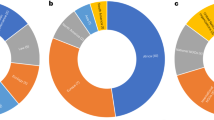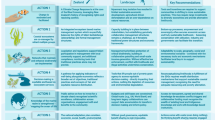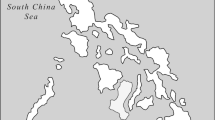Abstract
We apply theories of environmental governance, assemblage, and geo-epistemology to critically reflect on ocean planning in federal waters of the USA. US ocean planning was initiated in July 2010 when President Obama issued Executive Order 13547; this set in motion what was then called coastal and marine spatial planning, but without a congressional legislative mandate or budgetary appropriation. There are many reasons we might expect ocean planning to be centered in the US federal government, but ocean planning is transpiring in a neoliberal era in which there is little enthusiasm for “big government” and its projects. Thus, the project has been one of governance, with federal and state agencies participating along with non-government actors. What does a public planning process of this scope and geographic extent look like as a project of environmental governance? We focus on governance actors and the scale at which they operate, as well as the data infrastructure to support ocean planning, to analyze how US ocean planning is both illustrative of and contributes to our understanding of contemporary environmental governance. We have argued elsewhere that ocean planning in the USA has the potential to deliver outcomes alternative to marginalization of communities and enclosure of environments for capital accumulation, but this potential is fragile. In an era of unstable government when executive orders can be issued and revoked at the whim of the White House, questions about who/how ocean planning is carried in real space/time become even more important.
Similar content being viewed by others
Notes
In prior publications, we have used the term marine spatial planning (MSP) to be consistent with the broader literature. In this paper, where we emphasize the shifting, emergent nature of a governance assemblage, we use the term that has emerged within this assemblage: ocean planning.
Although our formal (and funded) research on US ocean planning is complete, we continue to monitor events via government documents and initiatives, media reports, list-serves, etc.
We most often use the term “government” in place of the term “state,” to distinguish the generic “state” from any of the 50 US states. When we do invoke the generic “state,” we use the term “nation state.”
The USA has been producing nautical charts and coastal surveys for much longer, mainly to aid navigation. Historic charts are archived at https://historicalcharts.noaa.gov/faq.
Alaska/Arctic, Pacific Islands, West Coast, Gulf of Mexico, Northeast, Mid-Atlantic, South Atlantic, Caribbean, and Great Lakes
Figures are calculated using federal funding announcements archived at https://coast.noaa.gov/funding/archive.html.
Sea Grant (est. 1966) is a partnership between the US federal government via NOAA and 33 universities throughout the USA.
These figures were presented during an NROC Meeting on November 5, 2015, at the NH Department of Environmental Services in Portsmouth, NH. The presentation was entitled “The NROC Story,” and given to celebrate the 10-year anniversary of NROC.
Project funding is listed on the GBMF website (https://www.moore.org/grants).
We searched for all grants relevant to ocean planning in the Northeast and Mid-Atlantic. It is possible we missed some, in which case these figures are the minimum. Additional funds were provided to other partners, e.g., The Nature Conservancy, to support their MSP work. Because these grants were difficult to tie exclusively to ocean planning in our study regions, we did not include them in our calculations.
References
Acton, Leslie, Lisa M. Campbell, Jesse Cleary, Noella J. Gray, and Patrick N. Halpin. 2019. What is the Sargasso Sea? The problem of fixing space in a fluid ocean. Political Geography 68: 86–100. https://doi.org/10.1016/j.polgeo.2018.11.004.
Allen, John. 2011. Powerful assemblages? Area 43 (2): 154–157. https://doi.org/10.1111/j.1475-4762.2011.01005.x.
Allen, John, and Allan Cochrane. 2007. Beyond the territorial fix: regional assemblages, politics and power. Regional Studies 41 (9): 1161–1175. https://doi.org/10.1080/00343400701543348.
Anderson, Ben, and Colin McFarlane. 2011. Assemblage and geography. Area 43 (2): 124–127. https://doi.org/10.1111/j.1475-4762.2011.01004.x.
Bennett, Jane. 2005. The agency of assemblages and the North American blackout. Public Culture 17 (3): 445–465. https://doi.org/10.1215/08992363-17-3-445.
Boucquey, Noëlle, Luke Fairbanks, Kevin St. Martin, Lisa M. Campbell, and Bonnie McCay. 2016. The ontological politics of marine spatial planning: assembling the ocean and shaping the capacities of ‘Community’ and ‘Environment’. Geoforum 75: 1–11. https://doi.org/10.1016/j.geoforum.2016.06.014.
Boucquey, Noëlle, Kevin St. Martin, Luke Fairbanks, Lisa M. Campbell, and Sarah Wise. 2019. Ocean data portals: performing a new infrastructure for ocean governance. Environment and Planning D: Society and Space 37 (3): 484–503. https://doi.org/10.1177/0263775818822829.
Briassoulis, Helen. 2019. Governance as multiplicity: the assemblage thinking perspective. Policy Sciences 52: 419–450. https://doi.org/10.1007/s11077-018-09345-9.
Bridge, Gavin, and Tom Perreault. 2009. Environmental governance. In A companion to enviromental geography, ed. Noel Castree, David Demeritt, Diana Liverman, and Bruce Rhoads, 475–497. Chichester/Malden: Wiley-Blackwell.
Campbell, Lisa M., and Noella J. Gray. 2019. Area expansion versus effective and equitable management in international marine protected areas goals and targets. Marine Policy 100: 192–199. https://doi.org/10.1016/j.marpol.2018.11.030.
Campbell, Lisa M., Noella J. Gray, Luke Fairbanks, Jennifer J. Silver, Rebecca L. Gruby, Bradford A. Dubik, and Xavier Basurto. 2016. Global oceans governance: new and emerging issues. Annual Review of Environment and Resources 41: 517–543. https://doi.org/10.1146/annurev-environ-102014-021121.
Castree, Noel. 2008. Neoliberalising nature: the logics of deregulation and reregulation. Environment and Planning A 40 (1): 131–152
Crowder, Larry B., Gail Osherenko, Oran R. Young, Satie Airamé, Elliot A. Norse, Nancy Baron, John C. Day, et al. 2006. Resolving mismatches in US ocean governance. Science 313: 617–618.
Puig de la Bellacasa, Maria. 2011. Matters of care in technoscience: assembling neglected things. Social Studies of Science 41(1): 85–106. https://doi.org/10.1177/0306312710380301.
Fairbanks, Luke, Noëlle Boucquey, Lisa M. Campbell, and Sarah Wise. 2019. Remaking oceans governance: critical perspectives on marine spatial planning. Environment and Society 10: 122–140.
Fairbanks, Luke, Lisa M. Campbell, Noëlle Boucquey, and Kevin St. Martin. 2018. Assembling enclosure: reading marine spatial planning for alternatives. Annals of the American Association of Geographers 108(1): 144–161. https://doi.org/10.1080/24694452.2017.1345611.
Gopnik, Morgan. 2015. From the forest to the sea: public lands management and marine spatial planning. London; New York: Routledge, Taylor & Francis Group.
Havice, Elizabeth, and Anna Zalik. 2018. Ocean frontiers: epistemologies, jurisdictions, comodifications. International Social Science Journal 68 (229–230): 219–235. https://doi.org/10.1111/issj.12198.
Lemos, Maria Carmen, and Arun Agrawal. 2006. Environmental governance. Annual Review of Environment and Resources 31: 297–325.
Malakoff, David. 2018. Trump’s new oceans policy washes away Obama’s emphasis on conservation and climate. Science.
McCann, Eugene. 2011. Veritable inventions: cities, policies and assemblage. Area 43 (2): 143–147. https://doi.org/10.1111/j.1475-4762.2011.01011.x.
McLeod, Karen L., Jane Lubchenco, Steve R. Palumbi, and Andrew A. Rosenberg. 2005. Scientific consensus statement on marine ecosystem-based management, ed. signed by 217 academic scientists and policy experts with relevant expertise: communication partnership for science and the sea.
Mid-Atlantic Regional Planning Body. 2016. Mid-Atlantic regional ocean action plan.
Mid-Atlantic RPB. 2017. Draft semi-annual work plan and progress report, December 2017.
National Ocean Council (NOC). 2012. National Ocean Policy draft implementation plan. Washington, DC: National Ocean Council.
National Ocean Council (NOC). 2013a. National Ocean Policy final implementation plan. Washington, DC: National Ocean Council.
National Ocean Council (NOC). 2013b. Marine planning handbook. Washington, DC: National Ocean Council.
Northeast Regional Planning Body. 2016. Northeast ocean plan.
Rankin, William. 2016. After the map. In Cartograpy, naviagation and the transofrmation of territory in the twentieth century. Chicago and London: University of Chicago Press.
Robbins, Paul, and Brian Marks. 2010. Assemblage geographies. In The SAGE handbook of social geographies, ed. Smith Susan, R. Pain, S.A. Marston, and J.P. Jones, 176–194. Los Angeles: London SAGE.
Sagarin, Raphael D., and Mary Turnipseed. 2012. The public trust doctrine: where ecology meets natural resources management. Annual Review of Environment and Resources 37: 473–496.
Scott, James. 1998. Seeing like a state. How certain schemes to improve the human condition have failed. New Haven: Yale University Press.
Silver, Jennifer J., Noella J. Gray, Lisa M. Campbell, Luke W. Fairbanks, and Rebecca L. Gruby. 2015. Blue economy and competing discourses in international oceans governance. Journal of Environment & Development 24 (2): 135–160. https://doi.org/10.1177/1070496515580797.
Smythe, Tiffany C. 2017. Marine spatial planning as a tool for regional ocean governance?: an analysis of the New England ocean planning network. Ocean and Coastal Management 135: 11–24. https://doi.org/10.1016/j.ocecoaman.2016.10.015.
St. Martin, Kevin. 2005. Disrupting enclosure in New England fisheries. Capitalism Nature Socialism 16 (1): 63–80.
Steinberg, Phil E. 2001. The social construction of the ocean. New York: Cambridge University Press.
Taylor, Christine M., Brian Smith, and David Stein. 2012. The role of MarineCadastre.gov in offshore energy planning. 2012 Oceans, pp. 1–6. Hampton Roads, VA. https://doi.org/10.1109/OCEANS.2012.6405071.
U.S. Commission on Ocean Policy. 2004. An ocean blueprint for the 21st century: final report of the U.S. Commission on Ocean Policy. Washington, DC.
Voyer, Michelle, Genevieve Quirk, Alistair McIlgorm, and Kamal Azmi. 2018. Shades of blue: what do competing interpretations of the blue economy mean for oceans governance? Journal of Environmental Policy & Planning 20 (5): 595–616. https://doi.org/10.1080/1523908X.2018.1473153.
White House Council on Environmental Quality. 2010. Final recommendation of the Interagency Ocean Policy Task Force, July 19, 2010. Washington, DC: Executive Office of the President of the United States, White House Council on Environmental Quality.
Acknowledgments
We thank the numerous individuals we interviewed and interacted with for their time and thought. This article benefited from constructive feedback from two anonymous reviewers. This research was supported by the US National Science Foundation (Award Nos. 1155484, 1359943 and 1359805).
Author information
Authors and Affiliations
Corresponding author
Ethics declarations
Conflict of interest
The authors declare that they have no conflict of interest.
Additional information
Publisher’s note
Springer Nature remains neutral with regard to jurisdictional claims in published maps and institutional affiliations.
Rights and permissions
About this article
Cite this article
Campbell, L.M., St. Martin, K., Fairbanks, L. et al. The portal is the plan: governing US oceans in regional assemblages. Maritime Studies 19, 285–297 (2020). https://doi.org/10.1007/s40152-020-00173-3
Received:
Accepted:
Published:
Issue Date:
DOI: https://doi.org/10.1007/s40152-020-00173-3




